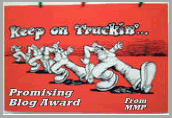Following is an interesting article from Psychology Today in regards to the health benefits of being optimistic. I have only reprinted a portion of the article. Because of Copyright protection you will have to follow the link to get the complete article, directly from Psychology Today.
Optimism as you know it isn't always the best medicine. In the new view, behavior trumps positive outlook. Why a healthy mentality paints the world in light and shadow.
By:Jill Neimark
The pain was blinding," recalls Larry Dossey of the afternoon last August when he was thrown by two different horses—within a mere two hours. Dossey, his wife, and another married couple had just spent two weeks camping and fly-fishing in the
Dossey, a doctor as well as an early champion of mind-body medicine, cracked his ribs when the first horse spooked; but he allowed the wranglers to mount him on a second horse—their most experienced one—with the hopes of reaching civilization soon. The second horse bolted up the mountain, lunged over an embankment, and sent Dossey flying. He fractured his spine, though he didn't know that at the time.
After testing his ability to wiggle his toes and turn his head, Dossey concluded his best chance for survival was to walk out of the wilderness. "I realized that this was an extraordinarily serious situation with no good solution that I nonetheless had to overcome," he recalls. "And somehow I knew I could overcome it with sufficient courage and resolve." So he suggested that the women, wranglers, and pack horses ride ahead, and that his friend accompany him by foot. Night fell. For 10 hours he walked, in pain "with every step, one flashlight between us, across some of the most rugged territory I've ever seen," says Dossey. "How do you eat an elephant? One bite at a time. I focused on the act of putting one foot in front of the other. I put my consciousness down in my feet. I stopped every 15 minutes to get on top of the pain."
At about 4 in the morning, they reached the wranglers' base camp, and from there his wife drove him to the small town of
That's an optimistic appraisal if there ever was one, but Dossey's background as an experienced physician—he's knowledgeable about both trauma and the impact of attitude on health—helped prepare him for what he calls "grounded optimism." So did his experience as a seasoned outdoorsman who'd made annual treks into wild country for three decades, and the fact that he'd served as a battalion surgeon in
Optimism: The New View
Optimism has long been considered a straightforward asset when battling illness or adversity. And, broadly speaking, it is. Harvard graduates who were optimists at age 25 had better health outcomes for the next three decades. As Dossey explains, "Optimists have more stable cardiovascular systems, more responsive immune systems, and less of a hormonal response to stress compared to pessimists. They have a stronger sense of self-efficacy, so they're more likely to invoke healthier behaviors because they think it can make a difference."
Of course, to be considered optimistic you have to have a positive long-term outlook and some degree of hope for the future. But a new view of optimism holds that to have a real impact on health, outlook is less important than behavior. By this definition, it is the act of engaging with the world, of taking concrete steps toward goals, that improves health. But there's a wrinkle: Under trying circumstances, optimism can actually lead to fatigue and temporary immune suppression. That finding has helped researchers rethink optimism and how it really works.
It turns out that our standard view of optimism is simplistic, and it is only by observing the nuanced impact of "optimistic" behaviors on the immune system that we can get a more complete picture of this coping style. Grounded optimism gives the brain a built-in action potential: It replaces emotion with motion.
In the end, the hidden key to optimists' better health outcomes may be their propensity to engage with the world and to persist in the face of difficulty, whether it's a night of agonized walking through the wilderness or the willingness to seek out second and third opinions for a medical condition. "Here's the really important piece to understand," says Suzanne Segerstrom, a
Segerstrom herself embodies this principle: She recently suffered an injury (also involving a horse) that led to unexpected complications, including bursitis and sciatica. "My attitude was, well, somebody has to fix this. So when one doctor couldn't help me, I found another. And I made progress."
Her conclusion? "The more I work on optimism, pessimism, and health, the more I believe optimism's benefits have less to do with mood and much more to do with persistence. The kind of optimism I study is based on a very simple concept: Do you think the future will be mostly good or mostly bad?" If you believe it will be mostly good, says Segerstrom, you'll be motivated to persist through tough times, whether you are naturally cheerful, a worrier, a grump, easygoing, or a bit neurotic.
Optimists' persistence is evident in a study conducted by Lise Solberg Nes, one of Segerstrom's graduate students. Subjects were given a series of anagrams to unscramble. One was impossible and the other 10 were difficult. Pessimists worked on the difficult anagrams an average of 9½ minutes, while optimists worked for an average of 11½ minutes. For the impossible anagram, pessimists worked an average of one minute, while optimists worked twice as long—two minutes.
Faced with a health challenge instead of an anagram, the active, problem-solving approach stands people in good stead. Carol Farran, a professor of nursing at
Farran's proactive outlook may have saved her life—it was she who discovered a lentil-size node in her breast. When it turned out to be breast cancer, Farran first suffered crying jags and panic attacks. Shortly after surgery, "I was out with my kids and panicking. We went to a music store, and I got a metronome. Symbolically it was very important. I could set the metronome to whatever speed I wanted, and it reminded me that I could set my life to my own time, fast or slow." Whenever she listened to the metronome, she remembered that it was her choice to reframe and reappraise her life. "It gave a certain meaning to my struggle," she concludes, and it is meaning that helps us regain a sense of control and mastery over our own lives. "You make new choices in life," says Farran. When one goal becomes impossible, the dispositional optimist will find another goal to work toward and bring satisfaction instead.
That ability to reframe life, to find new meaning, is part of an optimistic strategy. "When a crisis strikes," says






































